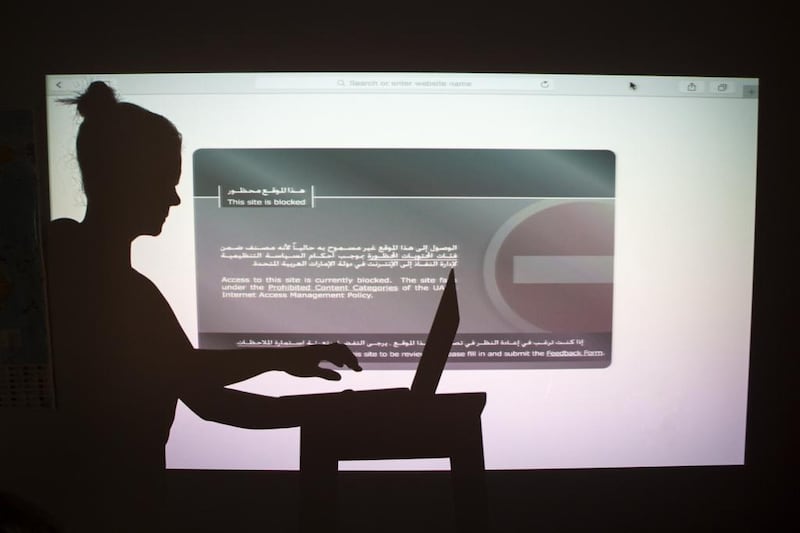ABU DHABI // Questions still remain as to the feasibility of prosecuting an individual for using virtual private network, despite a senior Abu Dhabi prosecutor attempting to clarify UAE laws.
Recent amendments were made to the 2012 cybercrime law, but accessing content or the internet by using VPN remains a dark area.
Humaid Aldarmaki, of the Abu Dhabi Public Prosecution Office, said that VPN is only illegal if used to make online calls that are not otherwise accessible, to download unauthorised media content or to bypass proxies and enter restricted websites.
Companies or banks often use VPN to access internal networks, which is permitted. But it is illegal to use them to access calling apps or programmes not permitted by the Telecommunications Regulatory Authority or the countries’ two telecoms providers, Mr Aldarmaki said.
“There is nothing that prevents the use of these apps if they were accessed without bypassing restrictions, and without having to use VPN or fraudulent IP addresses,” he said.
But he stressed: “If a person uses VPN to make calls that are not available for users, they will be punished according to the cybercrime law rulings and telecommunications regulatory law.”
The newly amended article in the 2012 cybercrime law says that anyone using a fraudulent IP address to commit a crime or prevent its discovery shall be punished by a prison sentence, a fine of Dh500,000 to Dh2 million, or both. This applies to anyone who uses a VPN to commit crimes outlined in the law, Mr Aldarmaki said.
UAE regulators have been criticised by residents and a member of the Federal National Council for blocking internet-calling services such as Apple's Facetime or Snapchat.
Many residents also use VPN to bypass copyright restrictions on entertainment content available in their home countries. For example, accessing the BBC on its iPlayer programme is restricted, and the network does not support the overseas use of iPlayer through VPN.
In addition to breaking local digital laws, unlicensed viewing of such websites could break international content agreements, said Tareq Masarweh, a senior consultant at Ovum specialising in telecommunications.
“BBC could prosecute, because they are in the middle – they are a content aggregator or media player,” he said.
The network could, in theory, take action if pushed by a content provider that says it has not given it the right to broadcast in the Middle East.
However, Mr Masarweh said he had never heard of such a case.
“When you deal with a large number of users and each one pays nine dollars, they wouldn’t waste time filing lawsuits,” he said.
“They could, instead, spread awareness that any British programming should not be broadcast. New technologies can actually detect VPN and proxies bypasses,” he said.
Breaking copyright agreements is illegal and one could be held accountable.
“So if the digital policy in the UAE said voice and accessing illegal content is illegal, the authorities in the country could say you are guilty,” he said.
Shiraz Sethi, senior associate at Stephenson Harwood Middle East, a London legal practice with offices in the region, said the changes applied to certain offences.
“It is not the case that ‘anyone who is using the internet’ risks being fined’. The new laws are specific to certain violations being committed,” he said.
The TRA regulates the policy on use of voice over internet protocol, or VoIP services, which facilitate online calls.
As they are the only licensed telecommunications providers, any internet-based calling platform that wishes to provide services in the UAE must approach Etisalat and du, he said.
“It has previously stated that VoIP services are still a prerogative of licensed providers, who reserve the right to provide such services through their networks,” said Mr Sethi.
“Currently Etisalat and du are the only licensed telecom providers, and, therefore, any VoIP platform that wishes to provide such a service in the UAE must approach those that are licensed.”
hdajani@thenational.ae
anwar@thenational.ae
________________________________________________________________
Survey results of VPN use
An informal poll of Emiratis and residents by The National found that nearly half – 23 out of 53 people – used VPNs. Four said they used to use one but stopped after media reports suggested it was illegal or because it slowed down their phone.
Nine of those who used VPNs said they did so to access blocked dating apps, eight said they used them for blocked websites in general, and five used them for free online calls. Others cited reasons such as work, downloading studying apps or watching Netflix.
Twenty-one people who used VPNs said they would not stop using them despite news about their illegality.
* Haneen Dajani and Naser Al Remeithi






